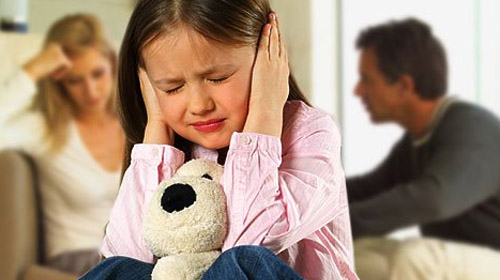Have You Heard of This Happening Before?
When I first meet with newly divorcing parents, I always inquire as to whether or not the kids know about the divorce. That question often prompts a small argument about who told Andy what. Though an agreement has usually been made between the parents to not tell the kids, or to wait and do it together, it often doesn’t work out that way. This happens for a number of reasons, the most innocent being that Andy asks one parent, directly, why they’re sleeping in the spare room or in the basement.
In this initial session with parents, there is often another issue that arises. This issue is that one of the parents often feels very, very tense living in the same house, and the other doesn’t want to separate from the children. This is a very common problem and not an easy one to solve, unless you have some ground rules in place, and some guidance as to how to navigate.
Divorce tips to Prevent Added Harm to Your Kids
To prevent the worse divorce effects on children, you must avoid having your kids pulled onto sides or unnecessarily distressed as you begin the divorce process. Follow these six pointers, and your children will be in much better shape than most.
1. Don’t fight in front of the kids — ever!
Study after study has shown that divorce itself isn’t such a catastrophe for children. The worst divorce effects on children come from their parents’ fighting in front of them. The effects of parental fighting go well beyond those of the children moving, changing schools, and going back and forth between two households.
This might be obvious to you, but too many well-meaning and intelligent people fall into the trap of thinking that fighting in front of the kids is not a big deal, downplaying it when it happens, and continuing in situations that are sure to lead to blowups that happen in front of the kids. Like I did.
It is now six years after my divorce. My 11-year-old daughter just commented the other day about an incident that happened in our home during our divorce, when tempers flared and we both ‘lost it’. My daughter occasionally tells us that our divorce was her fault, and in the same sentence, she refers to this incident. We were, after all, in conflict about her at the time. No matter how many times we explain to her what was happening – that it had nothing to do with anything she did – she seems to come back to this ‘understanding’ of hers that was solidified in her mind at age five. We made a number of mistakes that got us to the point of that blow up, and in this article, I’ll try to help you avoid them. No fighting in front of the kids. Seriously.
2. Don’t try to live together longer than is reasonable
Decisions to divorce seem to come quickly. It’s not that the word divorce has not been used in conversations between you before; but one minute, you’re staying together and the next, you’re divorcing. Then, all of sudden, while you’re reeling from this realization, you have to figure out how to deal with the consequences of this and, specifically, how you’ll either live together (in a different configuration) or move apart.
Many times, you and your spouse will both be living in the house after you’ve made the decision to divorce. One of you may move to another room or to the basement in an effort to ease the strain, but the tension in the house is still present.
As each week goes by, the tension rises until it reaches the point that you could cut it with a knife. This is extremely unhealthy for everyone, including your children. This is what leads to the worst divorce effects on children. Soon, what I call the “caged animal syndrome” sets in, and blowups are guaranteed. Do everyone a favor: Don’t try to stay in the same house for too long.
3. Before making any move (even downstairs), you should sit down together and talk with the kids
This is “the talk” that most parents dread. Just imagining it brings tears and overwhelming sadness to many parents.It is best to plan ahead of time (perhaps with the help of a therapist or divorce coach) what you and your spouse plan to say. The more relaxed the two of you can be, the better it will go for your children. Some professionals recommend that there be no tears from either of you during this talk. Personally, I think that a few tears are natural and shouldn’t be forcefully suppressed if they’re there. The main thing, whether you cry or not, is to assure your children that you are okay and that you will be okay. You can have your feelings, but it is not your child(ren)’s job to take care of them. Your children need to be able to process their own feelings instead of taking care of yours.
The main message (and sequence) of this talk should be:
Mom and Dad are separating or divorcing (whichever you have decided).
It is Mom and Dad’s decision to make as the adults.
Mom and Dad are both okay, and our decision is not because of you.
Although adults don’t always stay together, parents never leave their kids. We will both be with you forever. We will always be your mom and your dad, and nothing can change that. Again, our decision has nothing to do with you. You are great kid(s), and we’ll always love you and be there for you.
Both of you should be there together for this talk. Be open for questions that come over the next several weeks as your kids process this new information. If no questions come, ask your kids if they have any questions or concerns and how they’re feeling.
4. Tell the kids what to expect – but only as much as you know
If your kids are old enough to know the word divorce, they may well have a negative view of it. You can help them most by: Telling them what to expect as soon as you know what to expect. Make sure that what you tell them actually happens. If there are changes to any plans, tell them as soon as you know and confirm that you know that it is a change from what you told them. Keep changes to a minimum.
If you don’t know yet how much time your children will spend with each parent but you do know that you’ll co-parent, tell them they’ll still spend time with both of you and that you’re figuring out the details. If you don’t know yet whether you’re selling the house or where you’ll be living, tell them you don’t know, but that you promise you’ll let them know as soon as you know. If you can tell them each weekend what their week ahead will look like, they will be able to adjust and relax, as long as you ensure you follow through and make it happen the way you promised it would. When kids are told what to expect and can trust it, they relax.
5. If possible, celebrate as a family Mom or Dad’s new home
This may sound crazy, and I’m well aware that it is not realistic in some cases. However, if at all possible, when one parent moves out, have the entire family go together to celebrate the new house. If it helps you, think of it as going with your children to celebrate the new home they will be spending time in with the other most-important-person-in-the-world to them. If you and your spouse can do it this way, these are the gifts you will be giving your children.
You’ll send them a clear message that you know they’ll be safe in this new house.
You’ll let them know that you’ll be okay while they’re away from you (which they need to know).
You’ll be telling them that you aren’t mad at them for leaving you and that they don’t need to feel guilty when they’re with their other parent.
You’ll be showing them that your family is RESTRUCTURING – not dying.
I’ve worked with many couples that have been able to do this. Most of them have actually had a slumber party together in the new home. If there is yet another move (i.e. if the family home is sold), then they have another party at the next new home. Each time, I’ve heard wonderful stories of how great this was for the children. It’s a very respectful way to transition your children to this next stage of your family’s life. Celebrate your child’s new home with them. This is bigger than their birthday.
6. Get help creating a parenting plan.
Many couples try to do this piece themselves. Not only are there many fine points you won’t think of that can bite you later, but the amount of tension that results from trying to do this alone is not worth the money you’ll save. There are a few couples’ counselors that have experience with this, but not many. Mediators do this all the time, and their styles vary. A divorce coach that focuses on the kid’s best interest first is usually a good bet. Once you have worked through all of the issues and come to agreement on all the decisions that must be made, it is good to have your agreement reviewed by an attorney. I recommend that each of you have it reviewed independently, so that an attorney can assure you that you are not putting yourself in harm’s way. Make sure that your attorney knows that you’re not paying them to stir things up, but rather to ensure that you’re not making mistakes that will harm anyone.
Summary
Divorce is hard. Especially in the beginning. You can use these Divorce Tips to avoid common mistakes, and avoid the worst divorce effects on children. Remember that it is not the divorce per se that is so damaging to children but rather factors that are under your control – like fighting. Making a commitment to not fight in front of the children and talking with them skillfully about the upcoming divorce so that they understand it and don’t blame themselves.
Parents can also ease the transition to two separate homes by making this transition together and communicating that the child or children are safe and welcome in each place and the other parent doesn’t have hard feelings about it.
In all of these issues, communication is key. Let children know that their interests are very much on the forefront of your mind and that you’ll let them know what to expect as much as possible. (Note: This is NOT the same as pulling children into the dynamics between the partners!)

